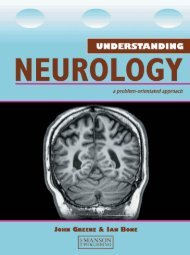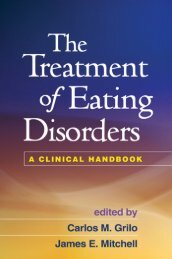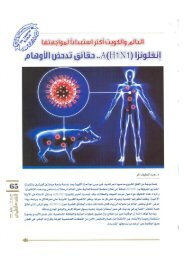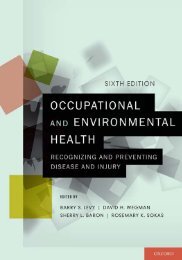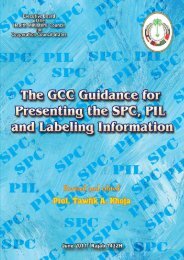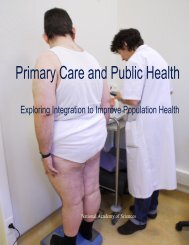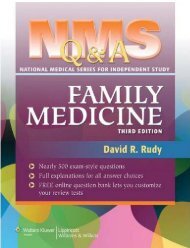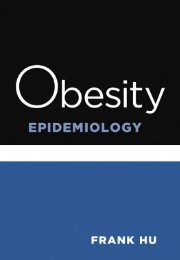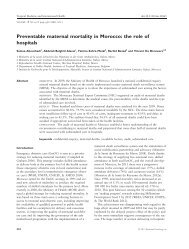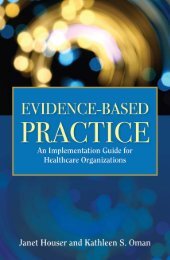Preventing Childhood Obesity - Evidence Policy and Practice.pdf
Preventing Childhood Obesity - Evidence Policy and Practice.pdf
Preventing Childhood Obesity - Evidence Policy and Practice.pdf
Create successful ePaper yourself
Turn your PDF publications into a flip-book with our unique Google optimized e-Paper software.
CHAPTER 10<br />
<strong>Obesity</strong> p revention in p rimary s chool s ettings:<br />
e vidence from i ntervention s tudies<br />
Juliana Kain, 1 Yang Gao, 2 Colleen Doak 3 <strong>and</strong> Simon Murphy 4<br />
1 Institute of Nutrition <strong>and</strong> Food Technology (INTA), University of Chile, Santiago, Chile<br />
2 School of Public Health, The Chinese University of Hong Kong, Hong Kong SAR, China<br />
3 Department of Health Sciences, Faculty of Earth <strong>and</strong> Life Sciences, VU University,<br />
Amsterdam, The Netherl<strong>and</strong>s<br />
4 Cardiff Institute of Society <strong>and</strong> Health, School of Social Sciences, Cardiff University,<br />
Cardiff, UK<br />
Summary <strong>and</strong> r ecommendations<br />
for p ractice<br />
• Interventions should be complex <strong>and</strong> ecological in<br />
nature, addressing the multiple <strong>and</strong> interactive<br />
influences on obesity, of which the primary school<br />
is one part.<br />
• Interventions within schools should be multi -<br />
faceted covering curriculum, policy <strong>and</strong> social <strong>and</strong><br />
physical environments.<br />
• School interventions should be developed <strong>and</strong><br />
implemented with community involvement.<br />
• Interventions within schools should address<br />
multiple rather than single risk behaviors.<br />
• Interventions should be implemented within a rigorous<br />
evaluation framework to develop an adequate<br />
evidence base <strong>and</strong> to assess their impact on health<br />
inequalities.<br />
Method<br />
References were searched <strong>and</strong> retrieved from international<br />
databases, including MEDLINE, EMBASE,<br />
<strong>Preventing</strong> <strong>Childhood</strong> <strong>Obesity</strong>. Edited by<br />
E. Waters, B.A. Swinburn, J.C. Seidell <strong>and</strong> R. Uauy.<br />
© 2010 Blackwell Publishing.<br />
PsycINFO, <strong>and</strong> Cochrane databases from 1991 to<br />
February 2008. Effective interventions were recommended<br />
mainly based on findings in systematic<br />
reviews.<br />
Rationale/ i mportance of<br />
p rimary s etting<br />
<strong>Childhood</strong> obesity has increased rapidly over the past<br />
two decades, both in developing <strong>and</strong> industrialized<br />
countries. 1 Interventions targeted at primary school -<br />
aged children are considered critical to prevent <strong>and</strong><br />
control this disease since food <strong>and</strong> physical activity<br />
related behaviors are established early in life <strong>and</strong><br />
persist into adulthood. 2 The life-course approach to<br />
public health suggests that interventions in early life<br />
may define lifelong behaviors <strong>and</strong> protect children<br />
from developing unhealthy dietary habits. Children<br />
aged 5 – 11 have been identified as the optimal group<br />
to target for interventions on physical activity <strong>and</strong><br />
healthy food preferences. 3 School settings are the<br />
prime focus for preventive actions since they cover<br />
most children in a country. Most children attend<br />
school approximately 180 days/year for six or more<br />
hours per day. 4 Children can easily be reached<br />
to assess their health needs, receive tailored interventions<br />
such as health education <strong>and</strong> physical activity<br />
promotion, be provided with healthy school<br />
meals, <strong>and</strong> be affected by environmental factors that<br />
79



